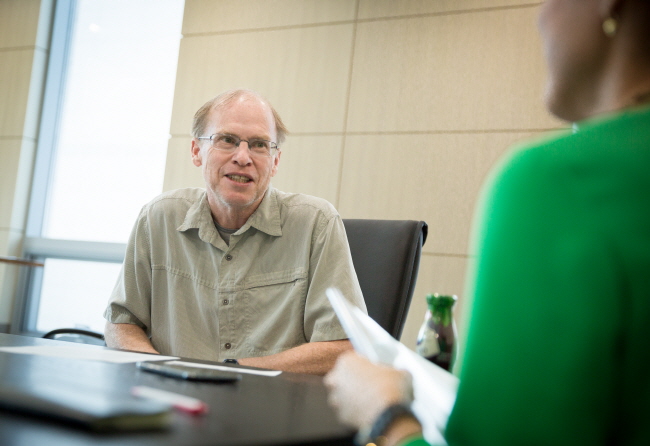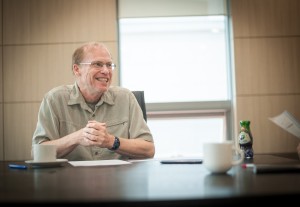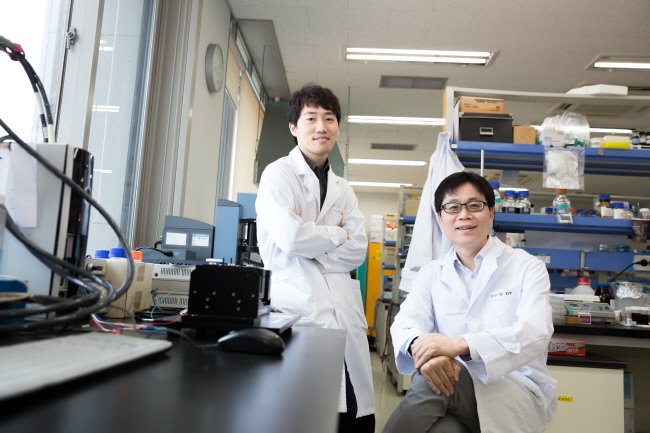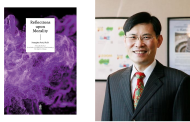Dr. Rodney S. Ruoff, Director of the Center for Multidimensional Carbon Materials (CMCM), Institute for Basic Science (IBS), and Distinguished Professor in the School of Natural Science at the Ulsan National Institute of Science and Technology (UNIST), has been selected to give the Materials Research Society (MRS)’s 2014 David Turnbull Lecture.
 I think that the Turnbull prize has been, in part, awarded to me for work that I’ve done extending back to the early 1990’s. I have worked on a variety of carbon materials, like Carbon-60, carbon nanotubes, carbon nanoparticles that encapsulated and protected metal nanocrystals, diamond but in unusual forms like diamond nanorods, and some other nanostructures including ß boron and metal boride nanotubes and nanoribbons, and so on. Since 1999, we started publishing on graphene, and I have been fortunate to pioneer many areas of graphene science.”
I think that the Turnbull prize has been, in part, awarded to me for work that I’ve done extending back to the early 1990’s. I have worked on a variety of carbon materials, like Carbon-60, carbon nanotubes, carbon nanoparticles that encapsulated and protected metal nanocrystals, diamond but in unusual forms like diamond nanorods, and some other nanostructures including ß boron and metal boride nanotubes and nanoribbons, and so on. Since 1999, we started publishing on graphene, and I have been fortunate to pioneer many areas of graphene science.”
The David Turnbull Lectureship recognizes the career of a scientist who has made outstanding contributions to understanding materials phenomena and properties through research, writing, and lecturing, as exemplified by the late David Turnbull of Harvard University. The Turnbull award will be presented at the 2014 MRS Fall Meeting in Boston on December 3rd and Dr. Ruoff will give the Turnbull Lecture on December 4th. This honor will soon be announced on the MRS web site and in the October issue of the MRS Bulletin.
Dr. Ruoff briefly stated his feelings about being chosen for this award during an interview with the UNIST Public Relations Team on October 8th. “I appreciated being nominated and am honored to have been chosen,” he said. “This is also recognition of the many students and postdocs who have worked in my group, as well as colleagues that I have been fortunate to collaborate with.”
The citation for Dr. Ruoff’s selection reads: “For Pioneering Discoveries Related to Carbon Materials and their Innovative Preparation, Characterization, and Mechanics.”
Dr. Ruoff recently founded the IBS CMCM at UNIST. In addition to being a World-leading pioneer in graphene and other carbon materials, he is an MRS Fellow as well as a Fellow of the American Physical Society and the American Association for the Advancement of Science.
“The IBS CMCM here at UNIST will make entirely new classes of carbon and related materials. We want to be an ‘Engine of Creation’ of new materials that will have remarkable properties. We are focusing on ‘high risk, high impact’ fundamental research. It is going to be very exciting,” Dr. Ruoff said.
When asked what advice he would give to aspiring young scientists, Dr. Ruoff responded: “Well, I think one should feel a tremendous passion for the science and be excited about doing something really new. Persistence is another key because there are no short cuts, you simply need to work very hard and that is why it should also be enjoyable. Being willing to make mistakes and of course to learn from them is important.” He notes that Einstein said, “I have little respect for that type of scientist who is always drilling through the thinnest part of the wood.” Dr. Ruoff then said, “that is, we should be brave and work on big challenges, and have some fun along the way.”
In addition to his remarks about doing important fundamental science, which Dr. Ruoff notes is the primary goal of all of the IBS centers in Korea, he also commented on the possibility for technological impact. “In the long run I expect that the CMCM will have a big impact on Korean and world-wide industry because of the many talented colleagues here at UNIST, in Korea, and in our networks throughout the world, who will have an interest in some of our new materials and will apply them in important and useful ways.”







![[2026 UNIST Matriculation] “Design Questions the World Has Never Seen!”](https://news.unist.ac.kr/wp-content/uploads/2026/02/사진-박종래-UNIST-총장이-2026년-입학식사를-전하고-있다-1-1-190x122.jpg)
![[2026 UNIST Commencement] “Become Way Makers Who Open Paths Where None Are Drawn!”](https://news.unist.ac.kr/wp-content/uploads/2026/02/사진-박종래-총장이-UNIST-학위수여식사를-전하고-있다-3-1-190x122.jpg)
![[2026 UNIST Commencement] Voices of Class of 2026](https://news.unist.ac.kr/wp-content/uploads/2026/02/Untitled1-190x122.jpg)



